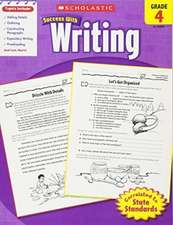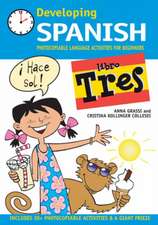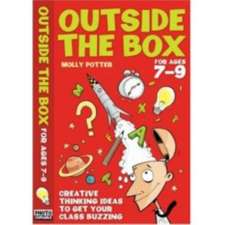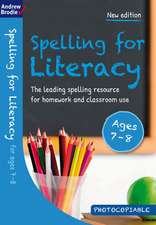MasterClass in History Education: Transforming Teaching and Learning: MasterClass
Editat de Christine Counsell, Katharine Burn, Arthur Chapman Sue Brindleyen Limba Engleză Paperback – 5 oct 2016
| Toate formatele și edițiile | Preț | Express |
|---|---|---|
| Paperback (1) | 203.10 lei 6-8 săpt. | |
| Bloomsbury Publishing – 5 oct 2016 | 203.10 lei 6-8 săpt. | |
| Hardback (1) | 840.99 lei 6-8 săpt. | |
| Bloomsbury Publishing – 5 oct 2016 | 840.99 lei 6-8 săpt. |
Preț: 203.10 lei
Preț vechi: 232.48 lei
-13% Nou
Puncte Express: 305
Preț estimativ în valută:
38.86€ • 40.69$ • 32.23£
38.86€ • 40.69$ • 32.23£
Carte tipărită la comandă
Livrare economică 10-24 aprilie
Preluare comenzi: 021 569.72.76
Specificații
ISBN-13: 9781472534873
ISBN-10: 1472534875
Pagini: 312
Dimensiuni: 189 x 246 x 24 mm
Greutate: 0.61 kg
Editura: Bloomsbury Publishing
Colecția Bloomsbury Academic
Seria MasterClass
Locul publicării:London, United Kingdom
ISBN-10: 1472534875
Pagini: 312
Dimensiuni: 189 x 246 x 24 mm
Greutate: 0.61 kg
Editura: Bloomsbury Publishing
Colecția Bloomsbury Academic
Seria MasterClass
Locul publicării:London, United Kingdom
Caracteristici
Issues relating to history education are clearly theorized and grounded in practical reflection and research
Notă biografică
Christine Counsell is Senior Lecturer in the Faculty of Education at the University of Cambridge, UK.Katharine Burn is Associate Professor of Education (History) at the University of Oxford, UK.Arthur Chapman is Senior Lecturer in History Education at IOE, UCL's Faculty of Education and Society, University College London, UK.
Cuprins
List of Figures and TablesNotes on ContributorsSeries Editor's ForewordIntroduction, Christine Counsell, Katharine Burn and Arthur ChapmanPart I: Researching History Education1.Historical Change: In Search of Argument, Rachel Foster2.Historical Causation: Counter-Factual Reasoning and the Power of Comparison, Ellen Buxton3.Knowledge and Language: Being Historical With Substantive Concepts, Michael Fordham4.Frameworks for Big History: Teaching History at Its Lower Resolutions, Rick Rogers5.Evidential Thinking: Language as Liberator and Gaoler, Paula Worth6.Historical Interpretation: Using On-Line Discussion, Daniel Magnoff7.Historical Significance: Giving Meaning to Local Places, Michael Harcourt8.Unmasking Diversity: Curriculum Rhetoric Meets the Classroom, Robert SomersPart II: Discussing History Education Research9.Causation, Chronology and Source Interpretation - Looking at School History from the Perspective of a University History Faculty: Reflections on Chapters by Ellen Buxton, Paula Worth and Rick Rogers, John Watts10.On The Dual Character Of Historical Thinking: Challenges For Teaching And Learning: Reflections on Chapters by Daniel Magnoff, Rachel Foster and Ellen Buxton, Allan Megill11.Exploring the Relationship between Substantive and Disciplinary Knowledge: Reflections on Chapters by Michael Fordham, Michael Harcourt and Daniel Magnoff, Kate Hammond12.Teaching for Historical Understanding: Thematic Continuities with the Work of Lawrence Stenhouse, Reflections on Chapters by Rachel Foster, Robert Somers and Paula Worth, John Elliott13.School Subjects as Powerful Knowledge: Lessons from HistoryReflections on Chapters by Rachel Foster, Ellen Buxton and Michael Fordham, Michael Young14.Breaking the Ice: Encouraging Students to Excavate the Familiar Surfaces of the Past Reflections on Chapters by Michael Harcourt, Michael Fordham and Robert Somers, Ed Podesta15.Redesigning History Education to Improve Pupils' Understanding: Implications for Theory and Research: Reflections on Chapters by Daniel Magnoff, Michael Harcourt And Rick Rogers, Carla Van Boxtel And Jannet Van Drie16.Voices From and Voices about the Past: Connecting Evidence, Significance and DiversityReflections on Chapters by Michael Harcourt, Robert Somers and Paula Worth, Izzy Jones17.History's Distinctive Contribution to Critical Citizenship: Reflections on Chapters by Rick Rogers, Rachel Foster and Ellen Buxton, Mark Sheehan Part III: Contextualising History Education Research18.Historical Thinking / Historical Knowing: On the Content of the Form of History Education, Arthur Chapman 19.Sustaining the Unresolving Tensions within History Education and Teacher Education, Katharine Burn20.History Teacher Publication and the Curricular 'What?': Mobilising Subject-Specific Professional Knowledge in a Culture of Genericism, Christine CounsellNotesReferencesIndex
Recenzii
Masterclass in History Education should be on the book shelf of anyone who is involved with teacher education or anyone engaged in history education research. For history teachers at large, it is a stimulating book that successfully bridges the divide between theory and practice.
An indispensable volume for anyone who wants to stay abreast of cutting-edge research in how we learn, teach, and ultimately come to understand the past.
Bridging the gap between academic research and practicing history teachers, this book offers a fascinating collection of teacher research reviewed and reflected upon from a number of perspectives from academia. The teacher research deals with familiar themes like causation, change and evidence, but also offers some refreshing new insights into teaching substantive concepts, big history frameworks, significance of localities and diversity - topics not often dealt with in the usual research on teaching history. The approach the editors have taken in composing this book is truly novel and results into compelling reading for anyone interested in history education at the level of school practice, teacher training or academic research.
This accessible and enjoyable collection serves as an excellent summary of the lively field of research in history education; a spur and inspiration for future practitioner research, and an invaluable guide to some of the issues which history teachers encounter on a day to day basis. Highly recommended for those entering into further study in education, heads of history departments looking for inspiration, and all classroom practitioners keen to be engaged in the ongoing discussion about history education in British schools. An invaluable companion.
An extraordinarily rich contribution to current debates about history teaching and about teachers' use of research to inform and enhance their practice. The diversity of ideas considered here, and the quality of teaching, writing and research engagement which informs each chapter, makes this a vital addition to any conscientious history teacher's reading list.
An indispensable volume for anyone who wants to stay abreast of cutting-edge research in how we learn, teach, and ultimately come to understand the past.
Bridging the gap between academic research and practicing history teachers, this book offers a fascinating collection of teacher research reviewed and reflected upon from a number of perspectives from academia. The teacher research deals with familiar themes like causation, change and evidence, but also offers some refreshing new insights into teaching substantive concepts, big history frameworks, significance of localities and diversity - topics not often dealt with in the usual research on teaching history. The approach the editors have taken in composing this book is truly novel and results into compelling reading for anyone interested in history education at the level of school practice, teacher training or academic research.
This accessible and enjoyable collection serves as an excellent summary of the lively field of research in history education; a spur and inspiration for future practitioner research, and an invaluable guide to some of the issues which history teachers encounter on a day to day basis. Highly recommended for those entering into further study in education, heads of history departments looking for inspiration, and all classroom practitioners keen to be engaged in the ongoing discussion about history education in British schools. An invaluable companion.
An extraordinarily rich contribution to current debates about history teaching and about teachers' use of research to inform and enhance their practice. The diversity of ideas considered here, and the quality of teaching, writing and research engagement which informs each chapter, makes this a vital addition to any conscientious history teacher's reading list.














